I’ve just spent the last 2 weeks in North Wales. During this time I have been party to the ceremonial ways of holding counsel. Each day we sat in a circle and followed the simple rule that one person spoke at a time. This reminded me of my time in Kyangwali particularly the unspoken etiquette pertaining to house visits.
There is something extraordinary about people who seem to be able to embrace the moment and do exactly as they feel without embarrassment. As a performer I expect you, dear reader, may well think that I am one of those people. In actual fact I have often felt somewhat awkward in social situations and often support myself with a glass of beer or two… or three. The performer allows many of my inhibitions to vanish as when in costume or make up I feel able to live up to amplified versions of myself. What does this have to do with my time in Uganda you may ask and I will indeed tell.
After long days of workshops that often involved running around in the sun in some form we were invited to visit some of the senior members of the group at their homes. This gesture of hospitality, including the whole drama group, neighbours and other family members, was not a one off and we visited quite a few abodes throughout our stay.
I should point out that the journey to any of these destinations was always a joyous occasion with a posse of kids keen to follow and observe the jolly party. I learnt my first real words of swahili on such a trip and could count to 10 by the return. My pronunciation was not always accurate and I could raise a smile with my attempts at ‘kanda’, the figure nine. No matter how many times I was told I could not grab the simple phonetic structure, I’m sure no real surprise to any of my former language teachers.
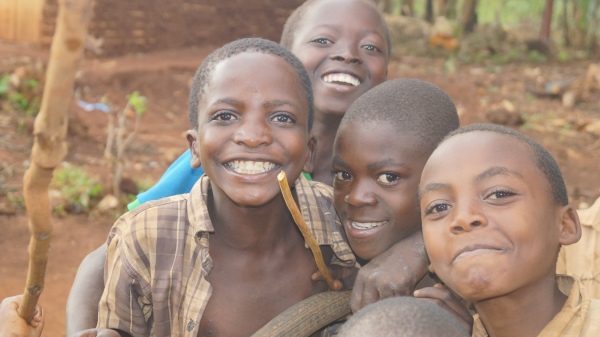
These jaunts would take us in different directions in the camp and we were almost always greeted with smiles, waves and the exclamation ‘Muzungu!’ (white man). It is quite something to have a group of children run towards you and embrace your legs, hold your hand and seem utterly content with this simple interaction. For weeks on returning to the UK I missed this simple beautiful gesture.
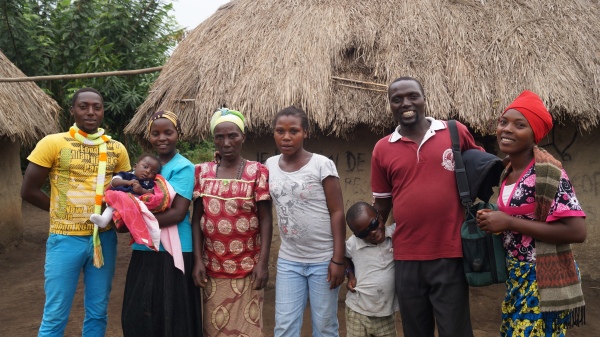
On arrival at our hosts we would be greeted and before very long music would be playing. At our first visit to Janvier’s house it took approximately 3 minutes before we were all dancing. The opt out option was non-existent and when I arose and strutted some steps I was welcomed by much chattering and laughing from the local kids keen to see the white man groove. I thought I was holding my own but really in the presence of such unabashed joy and rhythm I probably danced like my dad at a wedding. No offence dad.
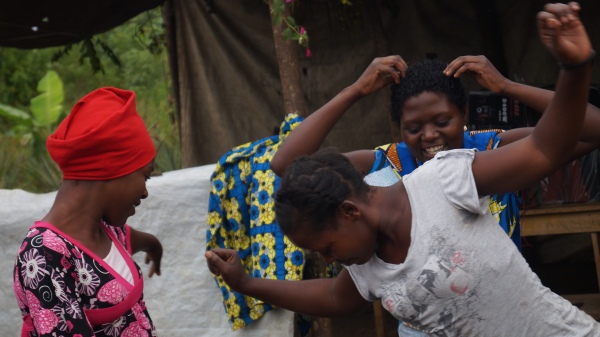
The same story could be told at DJ’s house only there was not any discernable time difference between arriving and dancing. Some of the drama group had been worn out by the days exertions but the steady beat, the sing along chorus and the infectious atmosphere put more life in their shoes that I had in my whole body.
The dancing can go on for sometime… and it is irresistible specially when invited on to the floor by some rather lovely people… lovely ladies in particular. So without a drop of dutch courage all you can do is give it what you’ve got.
The next part of the visit is the washing of hands. A bowl of hot water is circulated with soap and each takes it in turn to cleanse the palms. It is a simple yet humbling moment. I feel more aware of hygiene since I’ve been to Kyangwali because of this open, collective cleansing. It pre-empts the arrival of large saucepans and arrays of cutlery and plates.
The staple to any meal here is rice. Sometimes brown but often white rice that has been cooked with tomatoes to add flavour and seasoned differently depending on the cook. The other staple is beans, grown here in the camp, and cooked in a simple broth. Shredded cabbage makes up the vegetable selection and was part of our daily diet. However on these home visits we were introduced to other delicacies that included sombe, the leaf of the Cassava tree, two touch, which is like rubber and I have no idea where it comes from, and grilled maize on the cob. There were chipped potatoes, Irish potatoes and salad leaves again all grown in camp. After such a similar diet for a few weeks it was wonderful to eat sombe, green and spinach like, it filled my mouth with flavour and joy. In fact food tasted fantastic and although we ate similar dishes, with the addition of chicken and fish for the meat eaters, it was the knowledge that the produce was grown locally that inspired the palate. Here is eco living as it should be.
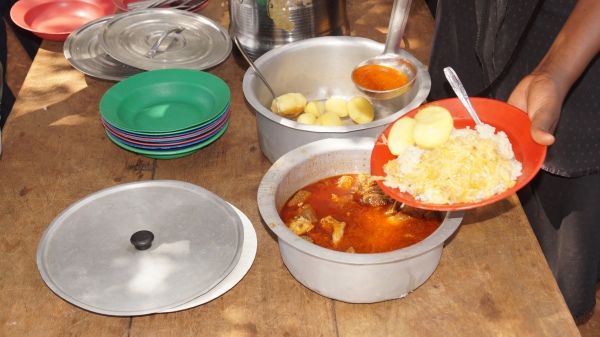
After filling our bellies at the invitation of the host we are offered a bottle of soda, pop to a Welsh boy like me. The ritual is completed when all methods of relieving the top from the bottle have been used including teeth, furniture and fist. At this point the after dinner chatter is easy and free and sometimes accompanied by music.
However the piece de resistance is the ceremony of the after dinner speeches. I just loved the formality of these often warm and insightful words. The host would rise and say a few words usually thanking the cooks, the wife and helpers, for the fine meal. Then an elder or someone with stature would be invited to talk and they would often refer to the host and his family in their address. When Benson spoke at DJ’s house he spoke of our hosts unswerving loyalty, his selflessness and drive to complete the work set out in CIYOTE’s manifesto. Benson also spoke of the sacrifices required and the need of family support in the work they so steadfastly deliver not only in the camp but back in the DRC. It is touching and evident that a clear and strong mutual respect and love is present between these two. At his own home Benson told us all that he was not a good husband. Using Nelson Mandela’s quote he reiterated that his work chose him and then took him away from his young family. He recalled his time in custody in the DRC when he was questioned about his children and he struggled to put an age to them all. This is not because he does not care but because he has taken on a challenging role in resolving the many problems facing Congolese refugees in Uganda…. and in turn this has meant traveling between Kyangwali, Kampala, Goma and across the atlantic at times. Here I witnessed the deep humility of a man who is nothing but inspirational to his people, his family and all comers yet so aware of his perceived failings. It is truly humbling to be in his presence as he gives this speech.
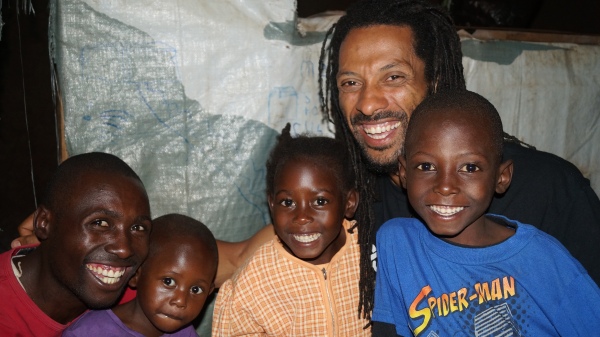
DJ, often the joker, the merrymaker, the enthusiast, addresses his own wife during his after dinner speech. He tells us and her that he is the vehicle but she is the engine and without her he would be unable to go anywhere. He talks of his many months away working in DRC knowing that she would be supportive of his work whilst working hard to raise their 3 children, grow food and run a small business. He acknowledges the help of his family, his brothers and neighbours in assisting in his absence. They reciprocate with words of support and pride in his work.
There are many speakers at every venue. Wives, brothers, fathers and muzungus are all invited to say a few words and I love this opportunity to tell people how inspired I am by their spirit, traditions and absolute commitment.
I would like to start these sort of traditions here in my circle of friends. I don’t know how exactly and fear it might seem dumb out of context. But I very much liked the connection that was made between those that spoke and those that listened. It was like the best after wedding speeches where the messages were heartfelt, warm and sincere but always relevant.
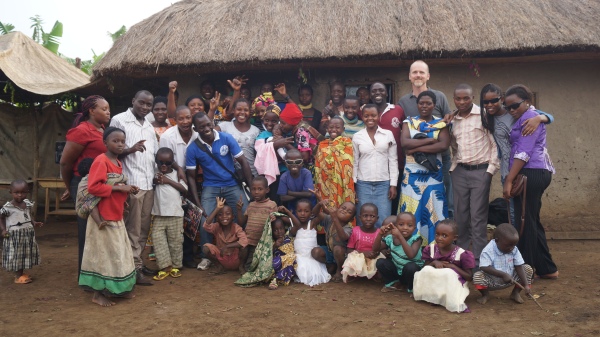
The word ceremony can seem so overblown in many ways but I am becoming more aware of its importance in marking an occasion and expressing ourselves clearly with a sense of purpose or intent. So if you are invited over for dinner in the next few months… prepare a speech because you are going to have to give one…. well that’s my thinking.
Gareth
All photographs by Jason Camilleri
To find out more about the work of TVO and Dr. Jennifer Hartley
http://www.theatreversusoppression.com/
To find out more about CIYOTA www.coburwas.org/

